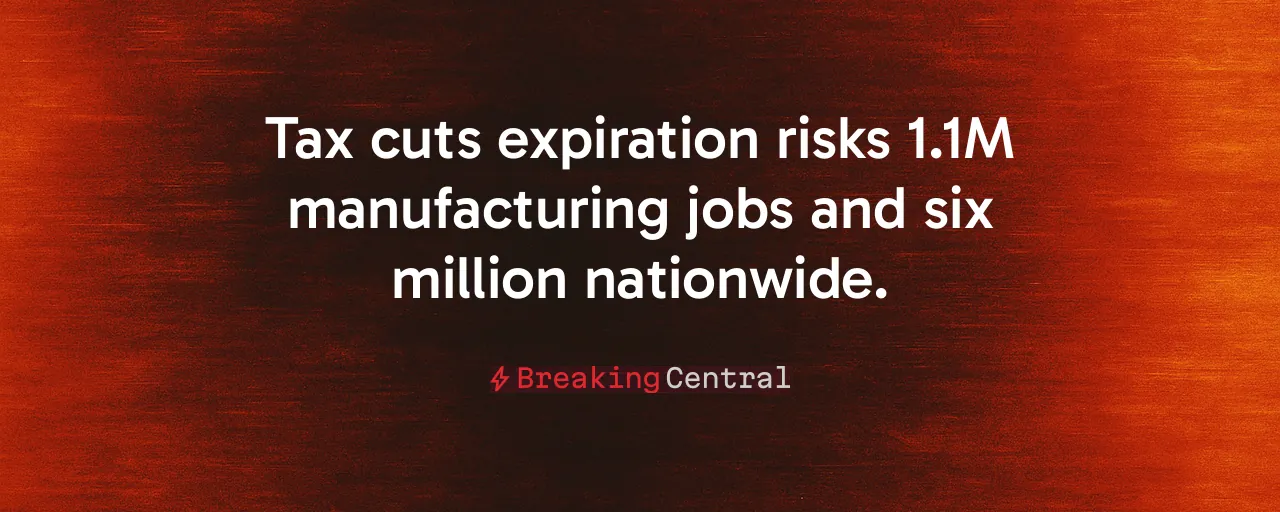A Threat to American Prosperity
A factory full of workers, machines running, and families thriving on steady paychecks could become a memory if Congress fails to act. A recent report projects that letting the 2017 Tax Cuts and Jobs Act expire in 2025 will eliminate 1.1 million manufacturing jobs and nearly six million jobs nationwide. These losses will hit communities hard, from small-town plants to urban supply chains. The question is simple: why risk this devastation?
The 2017 Tax Cuts and Jobs Act sparked investment, hiring, and growth by cutting corporate rates to 21 percent and granting a 20 percent deduction for pass-through businesses. These policies empowered small manufacturers to buy equipment, expand payrolls, and compete worldwide. With these provisions set to lapse, the economic gains hang in the balance. Can lawmakers afford to ignore this?
Small businesses drive our economy, yet they face the greatest threat. Over 96 percent of U.S. firms are pass-throughs, taxed at individual rates. The 20 percent deduction helps them rival larger corporations. A National Association of Manufacturers survey reveals 93 percent of these businesses fear losing this relief will cripple their ability to invest, hire, or grow. This impacts real people, with consequences extending far beyond financial figures.
Consider the local manufacturer sponsoring a school fundraiser or keeping a rural town's economy alive. These firms, often with fewer than 20 employees, make up 74 percent of the sector. Letting their tax relief vanish betrays the workers and families who rely on them. Prioritizing their survival is essential for Congress.
The choice is clear. Extending the tax cuts preserves prosperity. Letting them expire invites economic decline. Lawmakers face a decision: stand with American workers or allow inaction.
Tax Relief Fuels Growth
Evidence proves tax cuts deliver results. The 2017 law increased business investment by 20 percent on average, grew the capital stock by 7 percent, and raised real wages by nearly 1 percent, per economic analyses. Full expensing and R&D deductions enabled manufacturers to modernize quickly, strengthening global competitiveness. Since 2019, private investment has exceeded historical trends by $430 billion, with factory construction leading the charge.
Family-owned businesses, employing 59 percent of workers and generating 54 percent of private-sector GDP, flourish under these policies. The doubled estate tax exemption shields them from devastating taxes when owners pass away. If this exemption halves in 2025, asset-heavy firms may sell vital equipment to pay taxes. Why penalize families for building lasting enterprises?
Some claim these cuts favor only the rich. That argument falls flat. The doubled standard deduction and enhanced child tax credit ease burdens for middle-class families, streamlining tax filing. The U.S. Chamber of Commerce highlights that pass-through firms, rather than corporate titans, drive over half of private-sector employment. Their tax relief fuels jobs, not luxury spending.
Others warn of deficits, but the Joint Committee on Taxation ties accelerated depreciation to higher manufacturing investment, which expands the tax base. Allowing these policies to lapse will shrink economic output and will not solve fiscal woes. Those fixated on revenue over jobs overlook the power of a growing economy to fund itself.
The Price of Doing Nothing
Without action, the pass-through deduction ends, increasing taxable income for owners by up to one-fifth. A manufacturer earning $200,000 could lose a $40,000 deduction, facing higher taxes and less cash for hiring. Bonus depreciation, now at 60 percent, will disappear by 2027, raising costs for new equipment. These changes undermine businesses at a critical time.
Manufacturers already navigate challenges like tariffs on Chinese goods, now at 20 to 145 percent, and new duties on Canada and Mexico. Meanwhile, the CHIPS and Science Act and Infrastructure Investment and Jobs Act fuel reshoring, with factory construction at historic highs. Raising taxes on firms driving this growth makes no sense.
The estate tax reduction adds insult to injury. Family manufacturers, vital to supply chains, may liquidate assets to cover taxes if the exemption drops. With only 30 percent of family firms surviving to a second generation, higher taxes threaten their legacy. Will Congress sacrifice these businesses for fleeting revenue?
Secure Our Economic Future
Extending the 2017 Tax Cuts and Jobs Act is about protecting workers, families, and communities. The One Big Beautiful Bill Act, a $4 trillion plan, would lock in these cuts, restore full expensing, and raise the SALT deduction cap, balancing costs with targeted spending cuts. This bold strategy ensures America's economic strength.
Lawmakers are urged to dismiss claims that tax relief only benefits the wealthy. Data show lower rates, pass-through deductions, and expensing drive investment and jobs for everyday Americans. Letting these policies expire will harm workers and families, offering no shield.
Congress faces a deadline of December 31, 2025. With millions of jobs at stake, decisive action is required from lawmakers. Will they champion American businesses and workers, or let indecision dismantle our economic progress? The decision rests with them, but the impact will shape our future.
